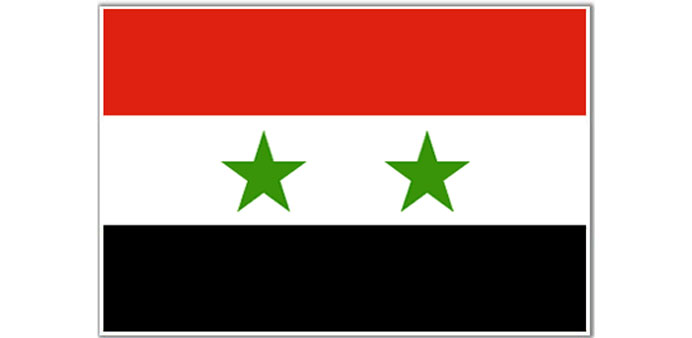AFP/Damascus
An independent Syrian lawmaker registered yesterday as the first challenger in a June presidential election widely expected to return incumbent Bashar al-Assad to power despite a raging civil war.
Assad’s government hit back at a torrent of international criticism of its decision to call the election despite the violence that has killed more than 150,000 people in three years, insisting it was its sovereign right to do so.
Assad has yet to declare his own candidacy but he is widely expected to stand and win a new seven-year term.
The authorities have not spelt out how they plan to hold a credible election with as much as 60% of Syria’s territory and 40% of its population outside their control, according to French geographer Fabrice Balanche.
But that did not stop independent lawmaker and former communist Maher Hajjar, a member of the regime-tolerated opposition, from registering his candidacy with the constitutional court.
Born in the main northern city of Aleppo in 1968, Hajjar was a member of the Syrian Communist Party until 2000, when he joined the Popular Will party of Qadri Jamil, state television said.
Jamil served as deputy foreign minister until October 2013 when Assad fired him and he moved to Moscow.
Hajjar “took part in the peaceful, popular movement at the start of the crisis”, the state broadcaster said referring to Arab Spring-inspired demonstrations against Assad’s rule that erupted in March 2011.
The protests quickly escalated into an armed uprising in the face of a deadly crackdown by Assad loyalists, triggering a descent into civil war.
As he filed his registration papers, Hajjar said he hoped to obtain the support of the 35 fellow members of the 250-member parliament he needs for his candidacy to be approved.
It will be the first presidential election organised by the regime—previously a referendum was held on a single candidate but that system was replaced by an amendment to the constitution.
Election rules require candidates to have lived in Syria for the past decade, effectively preventing key opposition figures in exile from standing.
Candidates have until May 1 to register and Syrians living abroad will vote on May 28.
The Syrian opposition has slammed the planned election as a “farce” while the United Nations and the Arab League have warned it will deal a heavy blow to efforts to broker a negotiated peace.
But a Syrian foreign ministry official said the United Nations and its envoy Lakhdar Brahimi were to blame for “obstructing” peace talks in Switzerland earlier this year which were abandoned after just two rounds.
A ministry statement said that calling the election was Syria’s “sovereign” right and that it would brook no interference.
“Western countries that make claims about democracy and freedom should listen to the opinion of the Syrians (to find out) who they will choose,” it said.
The heads of five UN agencies yesterday made an impassioned call to both sides in the conflict to allow aid deliveries countrywide, end siege warfare and halt indiscriminate attacks on civilians.
“The war escalates in many areas. The humanitarian situation deteriorates day after day,” the leaders of the UN humanitarian aid office and its children’s, refugee, food and health divisions said in a joint statement.
“For the civilians remaining in the cities of Aleppo and the Old City of Homs, as well as other parts of the country experiencing heavy fighting, the worst days seem yet to come,” they warned.
In Aleppo alone, at least 1mn people are now in need of urgent humanitarian assistance, but the road linking the northern city to Damascus has often been cut by the warring sides.
“All too often, humanitarian access to those in need is being denied by all sides. Aerial bombardment, rockets, mortars and other indiscriminate attacks slaughter innocent men, women, and children,” the aid chiefs said.
In Aleppo, there are now only 40 doctors for a population of 2.5mn, where once there were more than 2,000.
And across Syria, more than 9.3mn people are now affected by the conflict, they said.
“With a third of the nation’s water treatment plants no longer functioning, with 60% of health centres destroyed, and with some 3.5mn people living in areas under siege or unable to be reached with humanitarian assistance, the innocent civilians of Syria seem to be surviving on sheer courage,” they said.
Deadlock in Lebanon presidential vote
Lebanon’s parliament failed to elect a new president yesterday, with no candidate securing the two-thirds of the vote needed to win and many lawmakers leaving their ballots blank.
With the parliament divided between two powerful blocs, one centred around the Hezbollah movement and the other opposed to it, the outcome had been expected.
The parliament will now hold a second vote on April 30, in which the winning candidate will only need a simple majority of 65 votes.
In yesterday’s vote, 124 of the parliament’s 128 members were present, with 48 casting their ballots for Samir Geagea, the candidate backed by the March 14 movement opposed to Hezbollah.
A second candidate, Henri Helou, who is backed by members of a small bloc of independents and centrists, won 16 votes.

